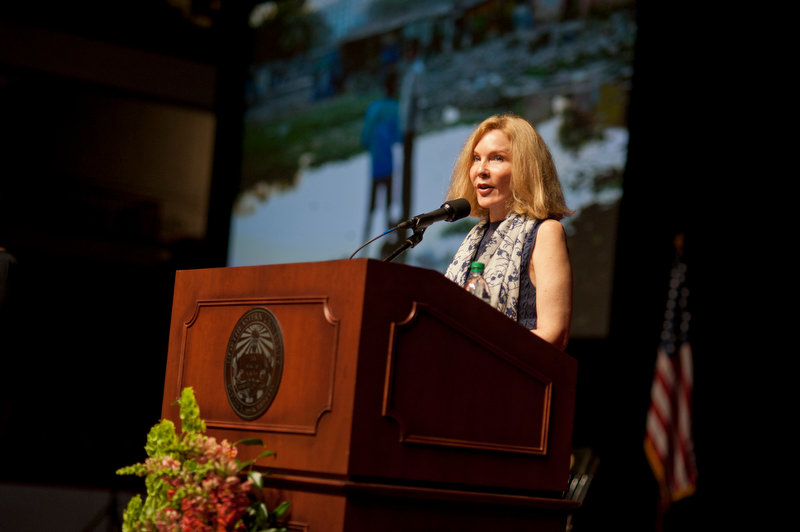First Pages author recounts experiences in India

As photos depicting life in a Mumbai slum scrolled behind her, Pulitzer Prize winner Katherine Boo spoke to new students and other members of the Northeastern community on Tuesday night in Matthews Arena about the people, places, and inequalities in India that inspired her first non-fiction book.
The book, Behind the Beautiful Forevers, was this year’s selection for a Northeastern reading program called First Pages, which requires incoming students—and encourages faculty, staff, and upperclassmen—to read a challenging book that highlights critical questions facing today’s students.
Boo is a staff writer at The New Yorker, a position she has held since 2003. Earlier in her career, she worked at The Washington Post, where she won the Pulitzer Prize in Public Service for uncovering the abuse of developmentally challenged people living in group homes.
Behind the Beautiful Forevers, which won the 2012 National Book Award for Nonfiction, tells the stories of people living in Annawadi, a slum in Mumbai surrounded by luxury hotels.
Boo suggested a reason for why some 2,800 first-year students were asked to read the book. “This is a great school,” she told them. “One of the things that is great about it is your professors and administrators are serious about educating you in a global context.”
She thought up the idea for her book after meeting her husband, Sunil Khilnani, and spending more time in India.
“My own work starts from questions,” Boo said. “Questions that won’t leave me be.”
Why, for example, did Mumbai have such great hospitals, but such poor life expectancy? Why did half the residents live in slums if records showed that no one there is technically poor?
In November 2007, Boo began following teenagers and other people who lived in Annawadi. In the first few months, she said she almost abandoned the project because she couldn’t work effectively.
When people living in the slums saw her, Boo said, they thought she was lost and staying in one of the nearby hotels.
“Basically, I was a circus act,” Boo said. “Over time, they got used to me and I got used to them. It wasn’t easy.”
Eventually, the people in the book became co-investigators, Boo said, helping her find the source of corruption and inequality. “I am operating on a hope…that making wrongs less invisible will eventually make those wrongs less common,” she said.
Following the talk, Boo answered questions from students and then signed copies of her book. One student asked Boo what people in India thought of her book. She said it was well received and she was proud it was seen as “real” in places like Mumbai.
“I worked really hard to get it published simultaneously in the United States and India,” Boo said. “It was not to be a book published in the west about India.”





